Crtd 15-10-00 Lastedit
20-12-13
Relativity Theory
Maybe this was just TOO crazy
After recently finishing the part of Musil's Der Mann Ohne
Eigenschaften that had set out to relate [see
my Musil relation], I
had promised myself to finally acquire understanding of relativity theory, probably
because Musil's protagonist Ulrich's last career disappointment had been
... mathematics! Ulrich's disappointment came a few days before the day where Musil's
book starts: for the first time a horse had had been called "genial" in a newspaper
which had prompted him to abandon his highly promising university math post with
immediate effect. He was 32, very good at it, known in the literature for some
results. No doubt he knew relativity theory: it was new, sensational, and if you
are trained to read it, you do so. Surely if you are Ulrich. But then came the
genial horse. At the start of Musil's book,
Ulrich had lost his very last jealousy and
ambition and, now firmly aware of the ridiculous state of man, from small to
great, and his history, took time off to search back in Vienna for purpose,
albeit with a worryingly blank notebook.
Not me. I would need quite a bit more time to loose my ambitions,
also to learn relativity theory, certainly after reading, in Der Mann,
the opinions of top Austrian Imperial government dignitary Graf Leinsdorf, who
shouted in 1913, when Einstein was engaged in publishing his general version of relativity theory while few yet had understood
the previous very simply first version: "This psychoanalysis and relativity
theory or how you call all that crap, it bubbles up irresponsibly, and does not
care for the larger social consequences! ... we quickly knock something together
and before we even started to look whether it is something viable we are already
engaged with the next, or even missed the whole thing! A piggery!". I can't help
thinking of those cats and dogs of new
Microsoft Windows versions raining on us. And not only that!
His Serene Highness Count Leinsdorf had a point
indeed.
But I had no time for relativity theory: my head, in 1982, was
fully occupied with my dissertation that caused, to my total surprise, a row
among the midget economics professors of Amsterdam University in 1983 and then
got read by nobody, at least nobody serious - probably no reason for the world
to mourn, though it is excellent, original and could have helped the intelligent
mathematical economist to efficiently order his procedures - but again: there
surely was no disaster there to prevent. Anyway, who listens to them?
I am still remembering with pleasure the making that analysis, 25
years old, with a university salary that I totally failed to consume, a 25%
teaching load and no publication pressure to threaten the quality of my work.

... my summer 1982
first reading (it looks I've just started!) of Musil's Der Mann ohne
Eigenschaften (got into it through Wittgenstein's Tractatus
Logico-Philosophicus by Ulrich's contemporary Viennese Ludwig Wittgenstein
who no doubt forms a substantial part of Musil's material for Ulrich's
personality) while writing my dissertation on dynamic logico-mathematical
analysis of economic theories (published as Neoclassical Theory
Structure and Theory Development, Studies in Contemporary Economics, Vol. 4,
Berlin, Heidelberg, New York, Tokyo: Springer Verlag, 1983 ...
In my early academic profession,
relativity theory was the most admired of theories. This surely
was caused by its overturning of a very admired and totally established
general
theory of physics, Newtonian mechanics, replacing it with something looking very
weird to the ordinary eye which nevertheless yields more accurate predictions
and descriptions of physical processes.
In the nineteenth century, the prediction and description problems
of Newtonian mechanics increased with the increase of the number of ways and of
the accuracy by which one learned to measure not only body movements, but especially
electricity and light in the nineteenth century. A proliferation of inperspicuous
and unsatisfactoy special laws and corrections to match theory with measurement
began to cause more and more headaches and frustrations among theoretical
physicists: things became a mess!
Roughly the choices were to 1) let chaos grow, 2) try to find a general error in which mankind was used,
for thousands of years, to measure time, or distance, or both, or, by far the
most absurd option, 3) to concede that our way to measure meters and seconds did
not result in the identical quantities for
every method of measuring physical processes, that is, to concede that
when meters and seconds in a system are measured from another system that
moves, they are meters and seconds of different lengths. This most absurd
third option to straighten the growing mass of measurement "errors" out
(implying they were no errors after all) turned out to win the prize, gain general acceptance and become
the new truth.
First, as so often in such cases, the idea was proposed by a nerd who had found a
living outside the academic world. After all, universities were originally
founded to maintain tradition, and keep doing so up into the wearing of those
ridiculous black guild suits of three centuries ago. We should be happy that this outsider
did so a century ago, since nowadays he would surely not have found people
willing to consider his very strange and difficult solution of the puzzle. There
are so many of those fools aren't there? And we have no more time nowadays to
read other people's thoughts: we have to publish!
Einstein presented a crude relativity
theory for very special cases of systems
moving in space without any acceleration or deceleration, hence even without
gravity forces.
Many physicists, and not the worst, opposed relativity theory.
Despite the extremely restrictive conditions of the first version, these Heroic
Defenders of Academic Tradition quickly lost the battle, due to overwhelming success of relativity in applying to many
cases with far less need for cumbersome special corrections to make things fit.
Relativity theory soon did
better in quite some applications than Newtonian mechanics in describing lots of processes involving,
roughly, speeds of more than 100,000 km/sec, that is more than about a third of
the speed of light. Those are areas way off the public domain, only known to
specialist physics experimenters. In generally known common lower speed processes
relativity should be better than Newton as well, but
measurement had not yet reached the required precision to measure the
difference, and once it finally started to do so, these differences were, usually, only of
interest to experts.
My good luck was to find an emeritus professor of physics in the
12footdinghy
racing competitions, so I could get some help collecting the literature and
solving problems. But those came earlier than I thought and were more serious:
in a popular exposition, Einstein does the fundamental Lorentz transformation.
The most simple case even. The math is easy, but I got
no clue whatsoever what we were talking about: space and time shift relative
to the objects moving around but the speed of light is assumed constant.
But what is "constant"? Speed means: abridging some amount of space in some
amount of time. Now it does so while both keep changing. That light must be
smart indeed to keep track of all those movements, far smarter than myself to
say the least! I might need a real teacher ...
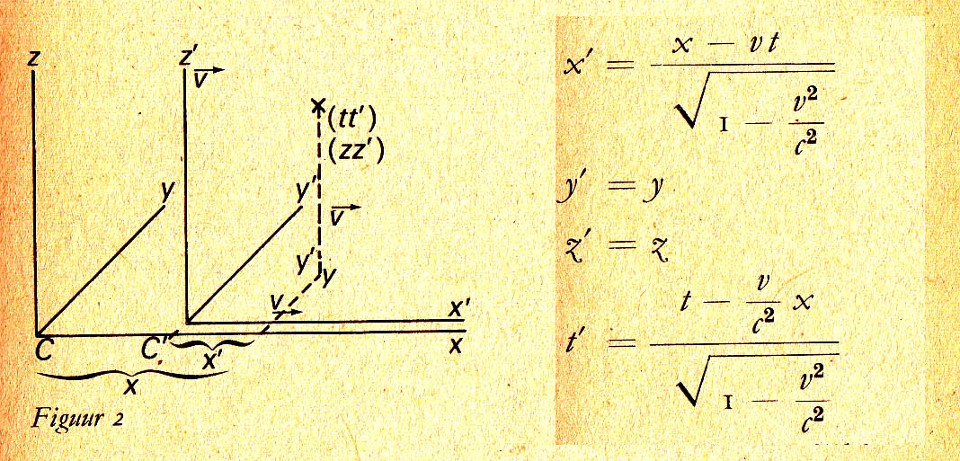
...
Lorentz-transformation. This was most of what Einstein needed for his first
(1905) revolution ...
The Utrecht University web site turned out a total disaster. Paddling around a
home page that was aggressively trying to divert my attention to a "virtual sleeping coach" and an
"anti-teasing program", I found, with great strain, a course
name "mechanics", but could not even find the address of the offices of the
physics staff, let alone the books, lecture rooms and times of service.
Nothing left but taking my car and heading for the "Uithof".
At the entrance of the large university campus a signpost encourages me to
navigate on the name of the street I wish to reach. A bit discouraging for I had
come in search of it. The design of the campus clearly shows how its
planners had wanted the world to be: wide empty bicycle lanes and bus lanes,
empty buses hence and forth. Totally crammed paid parking lots with electronic
signposts "FULL" in front, in between spacy grass fields that nobody ever uses
except the extensive fleet of motorized lawn mowers ... and even
sheep, at some places. I considered I might move towards and around in
Uithof cheaply and with carefree parking on a sheep, but wait ... could not even
a donkey or a horse do the job ... ecology and all that ... turds would contribute
to the global warming we need to survive the upcoming end of the
interglacial ...
"Physics"? To the university security officer engaged in writing number plates of illegally parked cars
that word
not ring a bell, but he did give me a quarter of compass that held, in his
opinion, an above-average chance. I managed to park. Legally. Large distances
from car parks to venues made me lucky with the
foldable bike I routinely keep in my car, but it would get stolen a week later.
I entered a building. Its signpost featured the building's name, that of someone I never heard
of - not was I ambitious to - but nothing else, in particular: not what could be
found inside. An exiting student apologized for not knowing
the whereabouts of physics: he was in informatics. I asked the muscular Arabic receptionist for the
physics department, but his face made clear that both the term "physics" and the
word "department" needed more explanation (where in the latter case I made no
progress trying the word "faculty").
"Well you know", the muscular Arabic receptionist told me, "This is the beta
building".
"That's not so bad at all", I replied "physics is pretty beta.
But is there any staff up here?"
"Staff ...", the man repeated with some
hesitation.
"I mean the office rooms of the people who teach here".
"Oh
yes, cross the hall and go up".
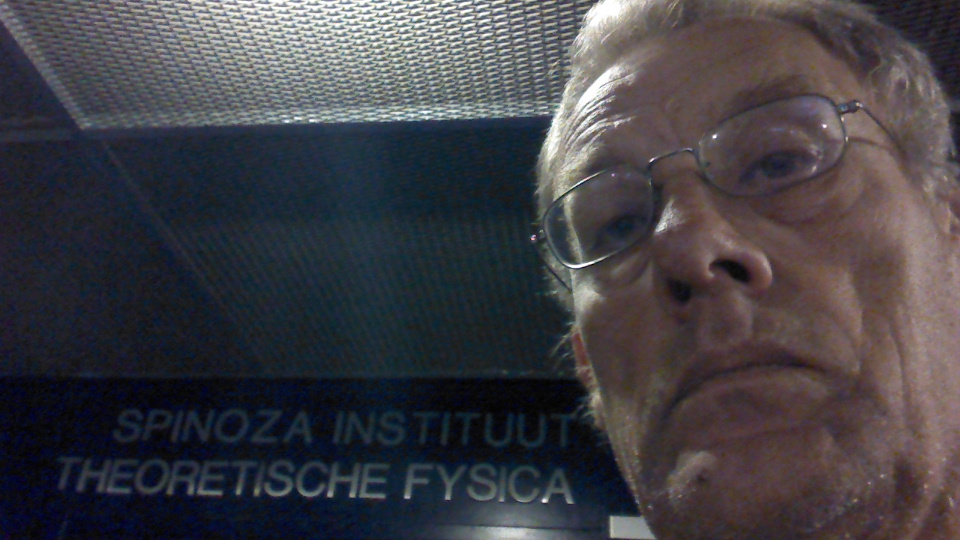
... I thought I was wrong: which physicist in his senses would associate
himself with a man so mistaken in his physical ideas as Spinoza, who, MIND YOU, lived
under Newton, so could easily have learned the physics of his time ...
I first thought I was dreaming: which physicist in his senses would
associate himself with a man so mistaken in his physical ideas as Spinoza, who
live when Newton's works reached Holland, who could easily have learned decent
physics instead of sticking to outdated Cartesian crap of a universe totally filled
with very fine particles, with no gravity, so they can only push each other and
form kind of twisters, small and big. Yes, he really believed such twisters
pushed the planets round en kept pushing himself against
the surface of the earth.
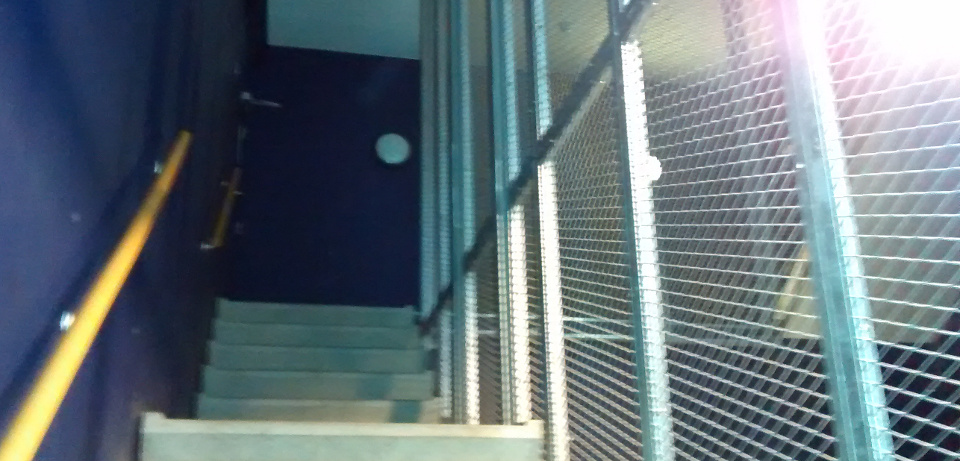
... trotting up: police arrest wing colours and hardware, physicists should be locked up firmly, seems the opinion ...
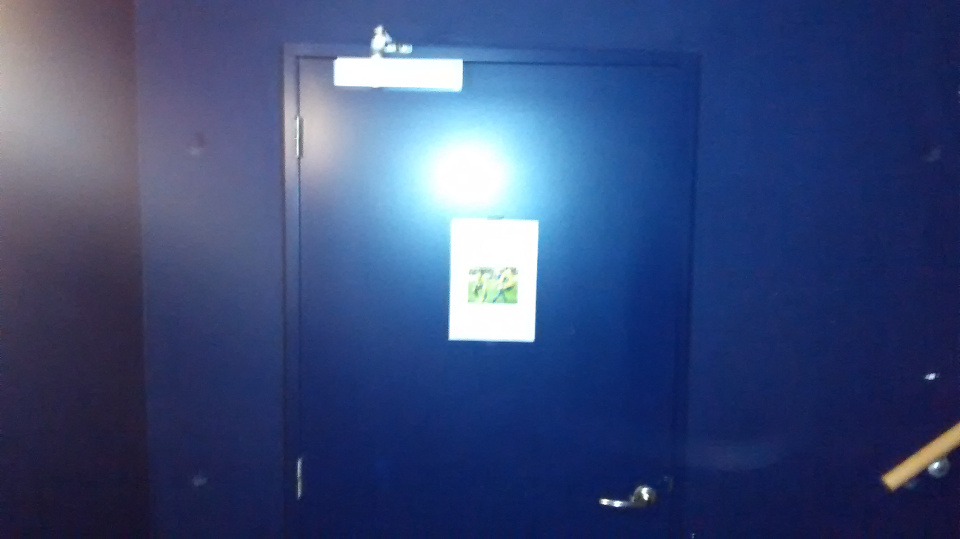
... blue darkness, blind doors ...
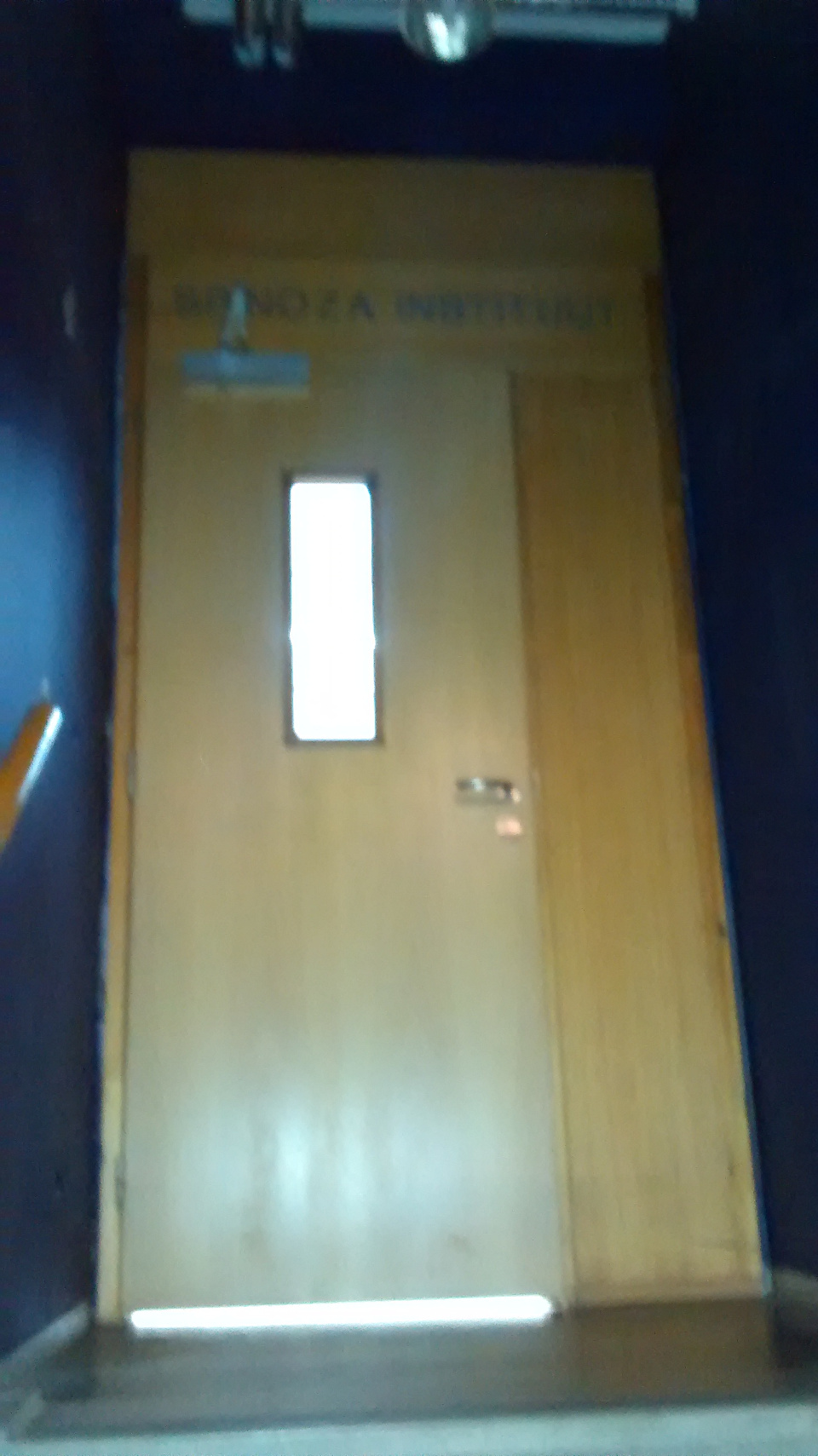
... Top floor: Spinoza Instituut ...
Behind that door I suddenly was in a bright comfortable top floor
unit with lots of roof light. A top research institute in physics. Spacy rooms,
though usually shared. In some, people were typing, in others two or three were
talking matrices, tensors, equilibria and filling chalk boards with wide
gestures. One thing was clear: if I would be given a desk here and allowed to
ask any question arising while studying relativity, I would be done in a few
days. The other: I did not belong here. These guys and girls were too good. All
around thirty, no
Dutch people either, except for the manager who kindly named
the building
where they know all about bachelor teaching.
Thank you.
Would not want to have missed this short digression.
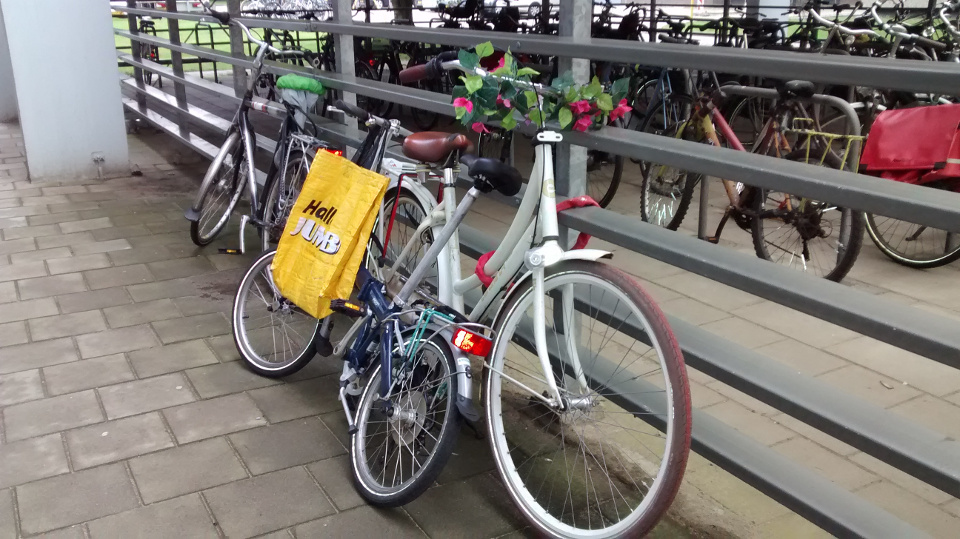
... Homing in on target, my foldable bike did not mind me to stay away long ...
The "Buys Ballot" building was surrounded by bicycles of the
encouraging type: the ones with those locks of a price equal to the bike itself. And the reception
staff knew the room number of Els, the manager of
physics courses. Els gave me all data of my mechanics course, and a staff web page to
find those data next time.
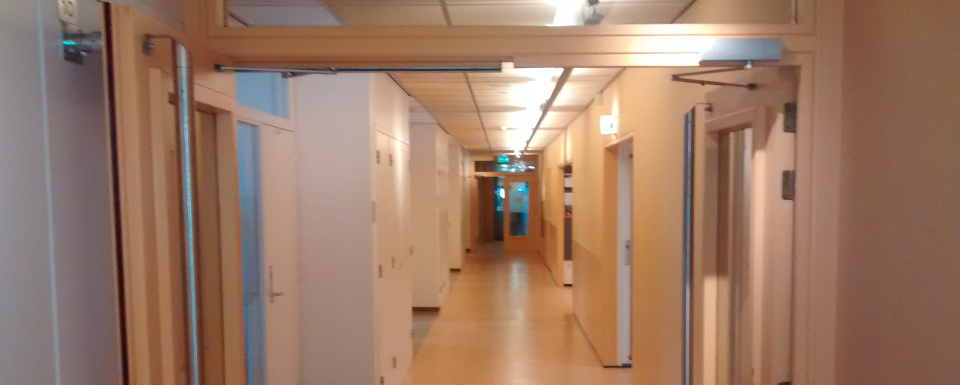
... reception knew Els' room, she helped me out ...
Not long after I returned home, my schedule sported signs it had not
seen for 16 years (blue is
12footdinghy competition sailing):

... Last
time my schedule sported this type of shit was December 1999 (but then even
worse: as a lecturer) ...
They had already started some weeks ago, but classical mechanics
(Newton, Kepler) had been done as well, most of which should be familiar to me.
So, the next Monday morning my alarm clock unchained me, I arrived
early, students told me what books and what lecture notes were used, and what is
the floor and room
number to buy them.
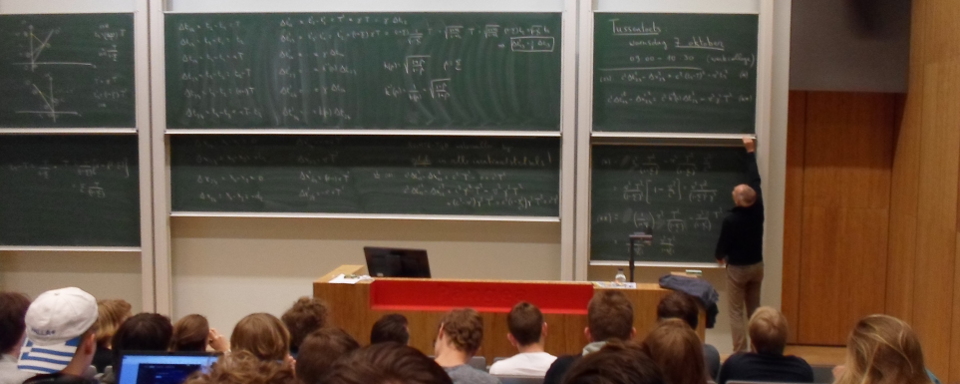
... this is serious!
...
There I sat, taking blackboard shots every one of which seemed to
require hours of work at home. Students are updated by a digital "blackboard" of
which I of course have no login. Well, by now I should have enough. I now realized why my search for my target had been a bit
erratic: I had accidentally taken a shrewd unused inroad over a campus security
officer, muscular Arab receptionist, Spinoza and Els. Smartly circumventing the
university's web welcoming page's "virtual sleeping coach" and "anti-teasing
program", I inadvertently managed to squeeze my notoriously oversized body
through an
unmonetized mouse hole entrance! I saved a value of at least some sizeable boxes of excellent Cuban sigars,
very agreeable smoking while covering paper with math (and then throwing most
them in the dustbin).
150 audience or so. Astronomy and physics bachelors. At face value
I seemed the only black student. Among these 17 and 18 year olds there were one or two
half African, quite some Asian, even more Arabic, everyone speaking Dutch. By far most
students were white and
Dutch, but clearly from all strata of society: here selection had been on brains
only! What a relief hearing them talking functions and equations in the
intermission instead of the ordinary adolescent bullshit.
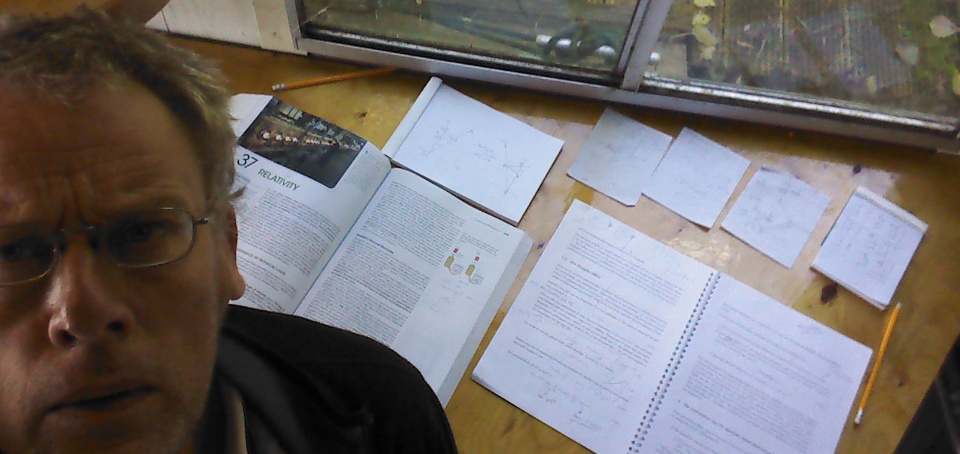
... On
September 28, 2015, I starting to cover paper with math ...
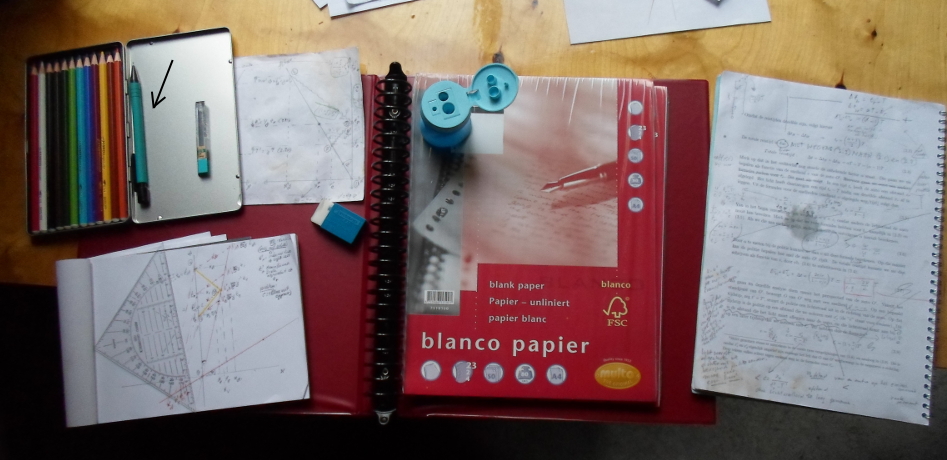
... old habits revived: non-digital hardware use ...
Since I last used non digital studying hardware twenty years ago (I lost my
last books in a
tornado on Lake Victoria, without much regret: all on internet now) the quality of colour pencils have
risen, multo-ring handling has become even more comfortable, pencil sharpeners
have further improved, geo-triangles are thinner and more flexible and there still
is replacement filling for my beloved carbon pencil (left at arrow) I
kept on me for over 15 years living in the
Alps, Africa, and wandering with my
Kangoo microcamper from
Inverness to Marrakech.









